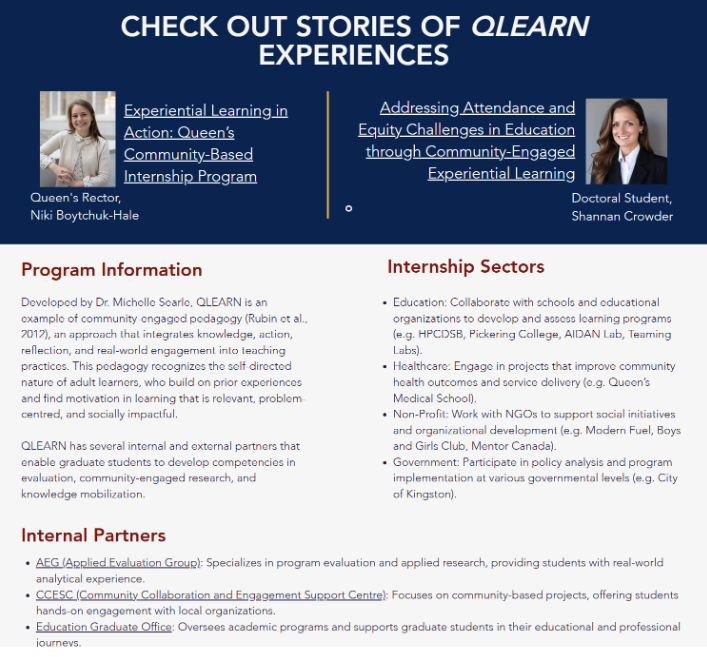In partnership with the Centre for Community Engagement and Social Change (CCESC) and the Assessment and Evaluation Group (AEG), Dr. Michelle Searle has launched QLEARN as a model of community engaged pedagogy. QLEARN is a holistic and innovative experience offers an opportunity for students to learn and apply research and evaluation skills with community partners. This course exemplifies the Queen’s University Community Engagement Framework, fostering connections between learning, teaching, and research through meaningful partnerships and collaborations with the broader community.
The origins of QLEARN...
The ideas for QLEARN build on prior experiences teaching and studying U/QEVAL, an open-university teaching and research partnership offered with Dr. Rebecca Gokiert (University of Alberta) as part of the Evaluation Capacity Network (SSHRC Partnership Grant). QEVAL was offered as part of Searle’s Education-in-Leaders Residence (ELiR) focused on creating a high-impact interdisciplinary initiative. The course was a layered initiative f designed as a research-learning partnership dedicated to strengthening students’ interdisciplinary skills as evaluators and researchers, empowering them to create positive change by engaging in community-engaged scholarship. Students describe the influence of community engaged evaluation learning:
“This course led me back to acknowledge my grandparents’ and Indigenous teachings through storytelling… this course is a remarkably challenging course, but the model used to guide the students is an incredibly good pedagogy tool. To be honest, this evaluation course was an awesome learning experience.”
Research indicated that students and partners sought more transformative learning experiences and required additional time to fully develop the potential for community-based research and evaluation as a co-learning, capacity building endeavour.
The concept for an internship cohort was funded by a Catalyst Grant, 2024-2025 from the CCESC. The idea was focused on student development in a community of practice that fostering evaluation and research skills through partner led projects. Partners included school districts, community arts organizations, health agencies, and municipal governments. The pilot addressed United Nations Sustainable Development Goals (SDGs) 3, 4, 5, 10, and 17 by promoting well-being, reducing inequalities, advancing gender equality, and enhancing student experiences through partnerships. Reflecting on learning during the pilot, students and partners shared
“Using existing resources and institutional practices to incorporate Evaluation capacity-building into my learning...By focusing on what resources exist and how they can be harnessed, I am practicing what I have learned.” - QLEARN pilot student
“Developing a strong working relationship with the community partner has inspired me to consider careers in education outside of teaching” – QLEARN pilot student
“Having valued members of our education community be able to identify an educational need for us and explore it in depth through their course work seemed like such a win-win.” - Community Partner
In Spring 2025, Michelle proposed to Graduate Studies the development of a two-credit course project, integrates the theory and practice of educational research and evaluation This initiative, now listed on the graduate timetable as QLEARN (EDUC 880/888). QLEARN builds relationships and fosters research in which learners and partners feel valued, heard, and inspired while collaborating on significant challenges.
So, what is QLEARN?

QLEARN is a teaching and research initiative that combines academic theory with real-world applications advancing community engagement as a form of co-learning that strengthens our collective ability to take action to contribute to positive social change. In addition to the afore-mentioned partners (AEG and CCESC) and many connections in the Faculty of Education and across campus (e.g. the Experiential Learning Hub), QLEARN represents collaboration with doctoral students, Jennifer Thompson and Shannan Crowder who help to bring QLEARN to life.
Launching QLEARN this year has not been a simple task. Dr. Searle and the QLEARN team have been working tirelessly to connect and engage with more than 20 community partners to promote Faculty of Education commitment to community engagement and advance evaluation as a form of applied collaborative research. To date, 13 partners are confirmed across a range of areas such as (a) education and school boards; (b) community health and wellness; (c) non-profit research & evaluation; and (d) higher education.
In June, we hosted two information sessions to provide an overview of QLEARN for potential students and interested community members. To enhance its reach and visibility we developed a webpage with details for community partners and learners. We are awaiting the results of iHub funding application submitted through Co-operative Education and Work-Integrated Learning Canada (CEWIL Canada). QLEARN is more than a course—it is a dynamic learning experience where students and community partners come together to integrate teaching, research, and learning into a single, interconnected, and iterative process. In doing so, they create opportunities for growth and transformation as a shared journey.
Get Involved in QLEARN and Learn More
Student enrollment is open throughout August with several students already expressing interest in some of the placements. The QLEARN team has begun matching students and community partners which will be confirmed before classes begin in September. More information about the impact of QLEARN and other examples of curricular and co-curricular community engaged teaching and learning will be featured when Principal Deane launches the Framework for Community Engagement at Queen’s on October 1, 2025, from 1-4pm at the Isabel Bader Centre for the Performing Arts.
Have other exciting community-engaged stories happening at Queen’s to share with us? Email communityandsocialchange@queensu.ca and let us know!